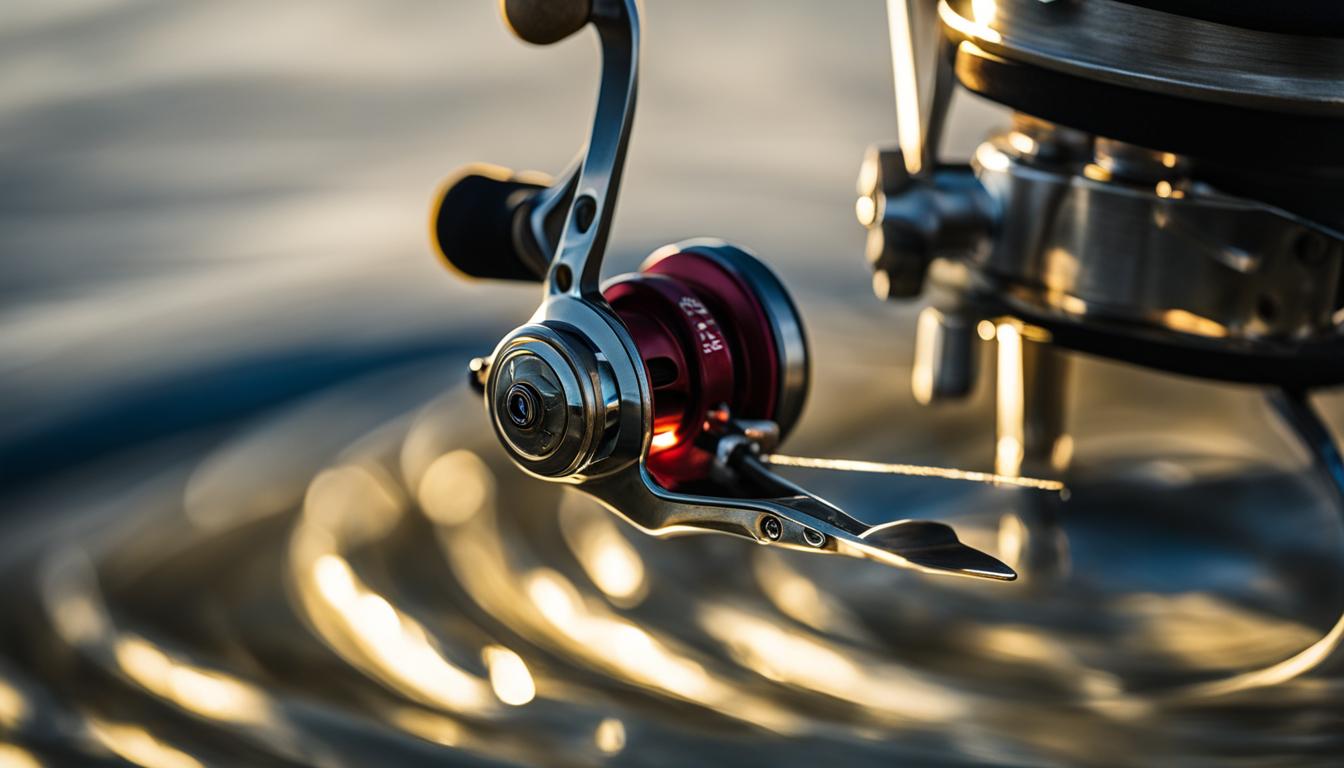Expert Angling Tips for Freshwater Fishing

Are you an angling enthusiast looking to improve your fishing skills? Freshwater fishing offers a fantastic opportunity to catch various species such as bass, trout, salmon, walleye, musky, crappie, and catfish. Whether you’re a beginner or an experienced angler, mastering the right techniques and using the appropriate gear can make a significant difference in your success on the water.
In this article, we will provide you with expert tips and insights to enhance your freshwater fishing experience. From selecting the right fishing gear to understanding fish behaviors and mastering casting techniques, we’ve got you covered. Get ready to optimize your fishing trips and enjoy the thrill of reeling in your next big catch!
Key Takeaways:
- Choose the right fishing gear and equipment based on the target fish species and water conditions.
- Familiarize yourself with local fishing regulations, including catch limits and size restrictions.
- Understand fish behaviors and habits to identify prime fishing locations.
- Prioritize safety and comfort on the water by wearing appropriate clothing and carrying essential safety equipment.
- Select the right bait and lures to attract your target fish species.
Choosing the Right Equipment for Freshwater Fishing
Selecting the right equipment is crucial for a successful freshwater fishing adventure. Whether you’re a beginner or a seasoned angler, having the right gear can make all the difference in your fishing experience. When choosing your fishing equipment, consider factors such as the target fish species, water conditions, and personal preferences.
Start with the fishing rod – the backbone of your angling setup. The fishing rod should be chosen based on the type of fishing you plan to do and the species you want to catch. From lightweight spinning rods for small fish to heavy-duty baitcasting rods for larger species, there are various options available to suit your needs.

Practicing Proper Fish Handling and Releasing
If you plan to catch and release fish, it’s crucial to handle them properly to ensure their survival and promote fish conservation. Following these fish handling and releasing techniques will help minimize stress and increase their chances of survival in the wild.
Wet your hands
Before touching the fish, wet your hands. This protects their sensitive slime coating, which acts as a natural defense against infection and parasites. Wet hands also prevent the fish from losing excessive amounts of protective moisture.
Use a gentle grip
When holding the fish, use a gentle grip to avoid injuring its delicate body. Avoid squeezing or applying excessive pressure. A gentle, yet secure hold ensures the fish feels safe and comfortable during handling.
Remove the hook carefully
When removing the hook, do it gently and efficiently. Use a pair of pliers or a hook remover tool if necessary. Minimize handling time to reduce stress on the fish. If the hook is deeply embedded, consider cutting the line near the hook and leaving it inside the fish.
Lower the fish gently into the water
When releasing the fish back into the water, lower it gently instead of tossing or dropping it. This reduces the impact and prevents potential injuries. Lowering the fish into the water head-first helps it regain its equilibrium and swim off easily.
Give the fish time to recover
Allow the fish time to recover before swimming off. Hold it gently in the water, supporting it until it shows signs of readiness to swim away. Patience is key during this crucial moment.
Practicing proper fish handling and releasing techniques not only ensures the well-being of individual fish but also contributes to fish conservation efforts. By minimizing stress on the fish and allowing them to continue their natural life cycle, we all play a part in maintaining healthy fish populations for future generations to enjoy.
Conclusion
By following these expert angling tips, you can enhance your freshwater fishing experience and increase your chances of success. Whether you’re a seasoned angler or just starting out, these strategies will help you make the most of your time on the water.
One of the key factors to successful freshwater fishing is selecting the right equipment. From choosing the perfect fishing rod and reel to picking the best tackle and bait, having the proper gear is essential for a productive fishing trip. Additionally, understanding the behaviors and habits of your target fish species allows you to make informed decisions about where and when to cast your line.
Fishing is not only about catching fish, but also about enjoying the experience. Prioritizing safety and following local fishing regulations ensures that you can have a peace of mind while out on the water. Remember to handle fish properly and practice catch and release techniques to contribute to fish conservation efforts.
So, grab your fishing gear, head to your favorite freshwater fishing spot, and have a great time on the water. With these expert angling tips in mind, you’ll be well on your way to successful freshwater fishing and creating lifelong memories.
FAQ
What are some expert angling tips for freshwater fishing?
Some expert angling tips for freshwater fishing include learning about fishing spots, selecting the right bait and tackle, familiarizing yourself with fishing regulations, understanding fish behaviors, prioritizing safety and comfort, mastering casting techniques, optimizing fishing times, and practicing proper fish handling and releasing.
How do I choose the right equipment for freshwater fishing?
When choosing equipment for freshwater fishing, consider factors such as the target fish species, water conditions, and personal preferences. This includes selecting the appropriate fishing rod, reel, line, and tackle. Investing in a quality tackle box can also help keep your gear organized.
What should I know about local fishing regulations?
Before heading out to fish, familiarize yourself with the local fishing regulations. These may include catch limits, size restrictions, specific gear requirements, and protected areas. Adhering to these guidelines helps preserve the ecosystem, fish populations, and avoids legal trouble.
How can I understand fish behaviors and habits?
Understanding fish behaviors and habits is essential for successful freshwater fishing. Different fish species have unique preferences for water temperature, depth, structure, and food sources. Learning about these factors will help you identify prime fishing locations and tailor your fishing techniques accordingly.
How do I ensure safety and comfort while fishing?
Prioritize personal safety and comfort while fishing by wearing appropriate clothing for the weather conditions, bringing safety equipment such as life jackets, a first aid kit, and a signaling device. Staying hydrated and having snacks on hand is important. Consider investing in seating enhancements like the Smooth Moves air seat for better support and reduced bodily stress.
What bait and lures should I use for freshwater fishing?
The choice of bait and lures depends on the fishing conditions and target fish species. Live baits such as worms, minnows, and insects can be effective in certain situations. Artificial lures like spinners, jigs, and crankbaits are also popular choices. Experiment with different options to find what works best for your specific fishing conditions.
How can I improve my casting techniques for freshwater fishing?
Proficiency in various casting techniques can greatly improve your fishing success. Master basic overhead casts and specialized styles like sidearm, roll, and pitch casts. Regular practice and experimentation will help develop your casting abilities, allowing you to adapt to different fishing situations and reach hard-to-access spots.
What are the most productive fishing times for freshwater fishing?
Fish are often more active during their feeding periods, which typically occur around dawn and dusk. Seasonal migrations and spawning activities can also influence fish behavior, making certain times of the year especially fruitful for angling. Keep an eye on local fishing reports and weather conditions to determine the best times to fish.
How should I handle and release fish during catch and release?
If you plan to catch and release fish, handle them properly to ensure their survival. Wet your hands before touching the fish to protect their sensitive slime coating, use a gentle grip, and remove the hook carefully. When releasing the fish, lower it gently into the water and give it time to recover before swimming off. This practice minimizes stress and promotes fish conservation.
What are some concluding tips for successful freshwater fishing?
By following these expert angling tips, you can enhance your freshwater fishing experience and increase your chances of success. From selecting the right equipment to understanding fish behaviors, practicing safety, and mastering casting techniques, each tip plays a role in improving your fishing skills. Remember to prioritize fish handling and conservation, and always stay up to date with local fishing regulations. Enjoy the thrill of successful freshwater fishing and create lifelong memories on the water.




